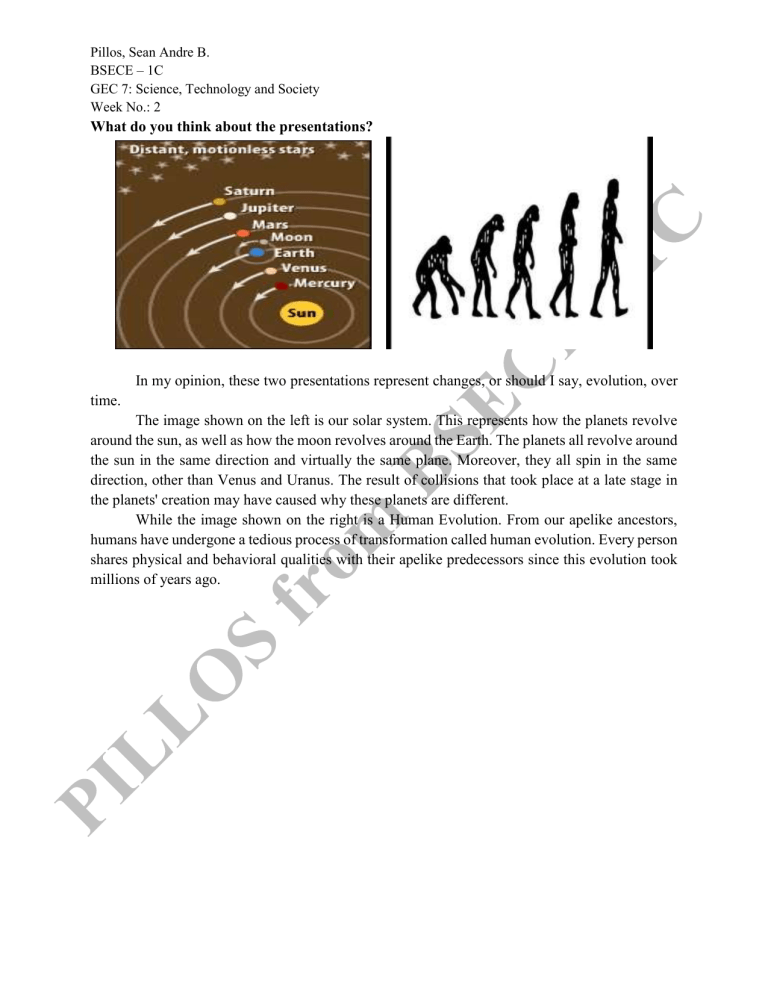
Pillos, Sean Andre B. BSECE – 1C GEC 7: Science, Technology and Society Week No.: 2 What do you think about the presentations? In my opinion, these two presentations represent changes, or should I say, evolution, over time. The image shown on the left is our solar system. This represents how the planets revolve around the sun, as well as how the moon revolves around the Earth. The planets all revolve around the sun in the same direction and virtually the same plane. Moreover, they all spin in the same direction, other than Venus and Uranus. The result of collisions that took place at a late stage in the planets' creation may have caused why these planets are different. While the image shown on the right is a Human Evolution. From our apelike ancestors, humans have undergone a tedious process of transformation called human evolution. Every person shares physical and behavioral qualities with their apelike predecessors since this evolution took millions of years ago. Pillos, Sean Andre B. BSECE – 1C GEC 7: Science, Technology and Society Week No.: 2 PROGRESS CHECK 1. Can you name other scientific revolutions that happened in the following places? a. Meso-America (3pts.) - As Meso-America's civilization rose and fell, different groups were given credit for various inventions and accomplishments. Several religious structures built by the ancient Meso-American peoples also incorporate astronomical elements. Mayan temples were oriented to align with the equinoxes, zenith passages, and Sun solstices around 500 B.C. Thereby, they could keep track of their activities throughout the years. These include a single observatory and three Sunrise Temple groups on the equinoxes and solstices. Additionally, "maize" or corn was developed, which has become one of the most widely used crops to this day. Rubber was another invention in this period that made an impact on our world in which they developed a bright blue paint of extreme durability. b. Asia (3pts.) - When it comes to contributions to science and technology, Asia has been influenced by India, China, and Western Asia. Japan, which is recognized for its electronics and automobile products, is currently the most prominent country in Asia in terms of technological and scientific achievements. Even as its population falls, Japan is committed to being the first country to demonstrate that it is possible to develop through innovation. Moreover, in recent years, China and India have also once again become major contributors to science and technology. The development of the numeration's decimal system in the past, including the digit zero, was India's most important mathematical contribution. c. Middle East (3pts.) - The potential of technology as a growth engine remains relatively unexplored in the Middle East, where states not only lack appropriately trained manpower and capital but also utilize these resources inefficiently. Technology dependence has increased the vulnerability of Arab nations to outside intervention and diminished their internal, national integration. A nation's integration is dependent on economic interactions within the broader social system, in which technological policies that are dependent on one another decrease such exchanges. Economists instead trade goods and services with foreign countries without involving the domestic population. As a result of limited internal cohesion, the nation is highly dependent on imports. The extent to which Arabs rely on imports for all of their needs is astounding. Currently, the vast majority of subcontracting to Arab countries is for tasks with poor value-added and low technology. Pillos, Sean Andre B. BSECE – 1C GEC 7: Science, Technology and Society Week No.: 2 d. Africa (3pts.) - In terms of human technological progress, Africa has the oldest track record on the planet. Such as the earliest stone tools in the world were discovered in Eastern Africa, and throughout Sub-Saharan Africa, later evidence of tool manufacturing by our earliest ancestors was found. As to other regions, the history of science and technology in Africa has gotten comparatively little attention, despite the substantial African advancements in mathematics, metallurgy, architecture, and other fields. 2. What do you think is Darwin’s contribution to modern science? (6pts.) - For me, one of Darwin's contributions to modern science is the idea of natural selection. Darwin's theory of natural selection accounts for the "design" of organisms, and for their wondrous diversity, as the result of natural processes, the gradual accumulation of spontaneously arisen variations (mutations) sorted out by natural selection. He discovered that mutations can prove as beneficial to a society by allowing a species to adapt to environmental changes. For example, Darwin observed that a population of giant tortoises found in the Galapagos Archipelago have longer necks than those that lived on other islands with dry lowlands. These tortoises were "selected" because they could reach more leaves and access more food than those with short necks. By being able to apply this to other animals, it changed the way that people thought about life on earth and opened new doors for science in the future. Additionally, this allowed us to gain a better understanding of our world, which in turn allowed us to change the way that we think. 3. How can Darwin’s evolutionary theory influence the following fields in modern times: a. Economy (3pts.) - Darwin's evolutionary theory has influenced economic processes as well as individual and collective economic behavior. As time passed, Darwin's work was proposed to have consequences for the economic system in the decades that followed its publication. Darwinism established the efficacy of competition and provided a rationale for capitalism. Understanding evolution has resulted in not only the agricultural but also medical giants. Thus, local and global economies were greatly influenced by both of these factors. Agricultural and medical intellectual property rights are protected in trade deals and agreements. b. Agriculture (3pts.) - Agriculture has been evolving for thousands of years under the influence of Darwin's theory of evolution. As a result of the processes of natural selection, wild plant populations adapt to changes in their environment. As the populations grow in diverse habitats or along a gradient of environmental conditions, this adaptation can be Pillos, Sean Andre B. BSECE – 1C GEC 7: Science, Technology and Society Week No.: 2 observed over time in the same population or by evaluating changes between the populations. Now that agricultural scientists fully grasp the mechanisms involved in evolution, gene mapping, and gene editing, agricultural scientists can generate entirely new crops and livestock. c. Political Science (3pts.) - Darwin's evolutionary theory has been utilized to pursue a variety of political goals and projects since it was originally formulated. Darwinism is cited in modern times by persons who claim to be liberals as part of a campaign against religion. However, the idea of evolution has always been accompanied by a desire for improvement in ethics and politics. Because the results of scientific inquiry are not used by "humanity," Darwinism characterizes species as having no communal purpose. Some people, rather, utilize science to manipulate others. Basically, the trade deals cited previously are part of global politics. d. Religion (3pts.) - Darwin's evolutionary theory has either had genuine influence or not at all in modern times. Since evolution is a technique God created life's diversity, it informs our beliefs rather than changing them. It is just as Christians did not all become atheists when Copernicus and Galileo proposed that the Earth was not the center of the universe when they first published their theories on Copernicus and Galileo's work. Moreover, apart from a few fundamentalist denominations in the US Evangelical community and the Middle East Muslim groups, religion has largely been ignored. This has hugely enraged the fundamentalists for no reason at all.




